BUSINESS AND CORPORATION LAW.
VerifiedAdded on 2023/01/20
|10
|2673
|98
AI Summary
Contribute Materials
Your contribution can guide someone’s learning journey. Share your
documents today.

Running Head: BUSINESS AND CORPORATION LAW 0
Commercial and Corporation law
4/20/2019
Student’s Name
Commercial and Corporation law
4/20/2019
Student’s Name
Secure Best Marks with AI Grader
Need help grading? Try our AI Grader for instant feedback on your assignments.
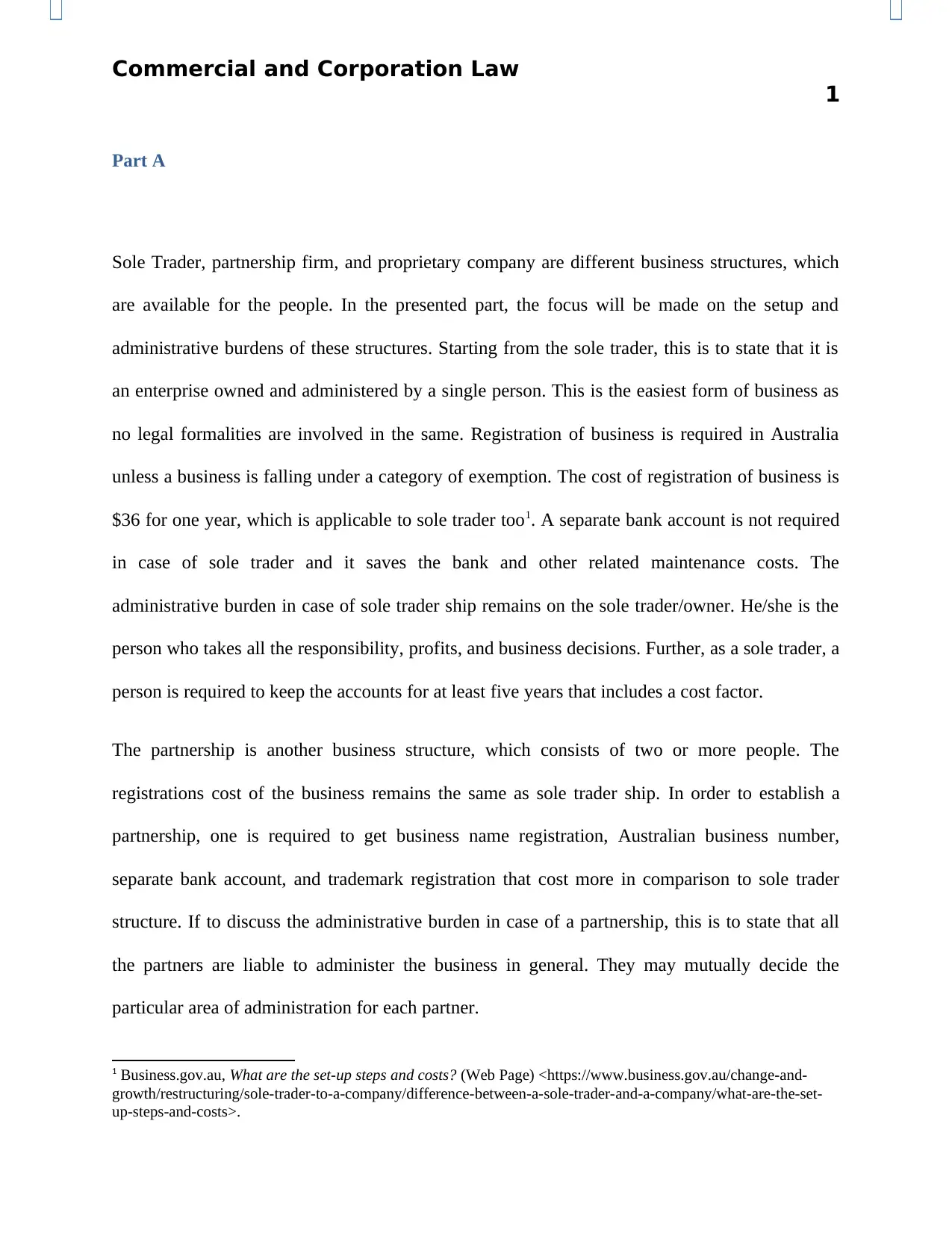
Commercial and Corporation Law
1
Part A
Sole Trader, partnership firm, and proprietary company are different business structures, which
are available for the people. In the presented part, the focus will be made on the setup and
administrative burdens of these structures. Starting from the sole trader, this is to state that it is
an enterprise owned and administered by a single person. This is the easiest form of business as
no legal formalities are involved in the same. Registration of business is required in Australia
unless a business is falling under a category of exemption. The cost of registration of business is
$36 for one year, which is applicable to sole trader too1. A separate bank account is not required
in case of sole trader and it saves the bank and other related maintenance costs. The
administrative burden in case of sole trader ship remains on the sole trader/owner. He/she is the
person who takes all the responsibility, profits, and business decisions. Further, as a sole trader, a
person is required to keep the accounts for at least five years that includes a cost factor.
The partnership is another business structure, which consists of two or more people. The
registrations cost of the business remains the same as sole trader ship. In order to establish a
partnership, one is required to get business name registration, Australian business number,
separate bank account, and trademark registration that cost more in comparison to sole trader
structure. If to discuss the administrative burden in case of a partnership, this is to state that all
the partners are liable to administer the business in general. They may mutually decide the
particular area of administration for each partner.
1 Business.gov.au, What are the set-up steps and costs? (Web Page) <https://www.business.gov.au/change-and-
growth/restructuring/sole-trader-to-a-company/difference-between-a-sole-trader-and-a-company/what-are-the-set-
up-steps-and-costs>.
1
Part A
Sole Trader, partnership firm, and proprietary company are different business structures, which
are available for the people. In the presented part, the focus will be made on the setup and
administrative burdens of these structures. Starting from the sole trader, this is to state that it is
an enterprise owned and administered by a single person. This is the easiest form of business as
no legal formalities are involved in the same. Registration of business is required in Australia
unless a business is falling under a category of exemption. The cost of registration of business is
$36 for one year, which is applicable to sole trader too1. A separate bank account is not required
in case of sole trader and it saves the bank and other related maintenance costs. The
administrative burden in case of sole trader ship remains on the sole trader/owner. He/she is the
person who takes all the responsibility, profits, and business decisions. Further, as a sole trader, a
person is required to keep the accounts for at least five years that includes a cost factor.
The partnership is another business structure, which consists of two or more people. The
registrations cost of the business remains the same as sole trader ship. In order to establish a
partnership, one is required to get business name registration, Australian business number,
separate bank account, and trademark registration that cost more in comparison to sole trader
structure. If to discuss the administrative burden in case of a partnership, this is to state that all
the partners are liable to administer the business in general. They may mutually decide the
particular area of administration for each partner.
1 Business.gov.au, What are the set-up steps and costs? (Web Page) <https://www.business.gov.au/change-and-
growth/restructuring/sole-trader-to-a-company/difference-between-a-sole-trader-and-a-company/what-are-the-set-
up-steps-and-costs>.
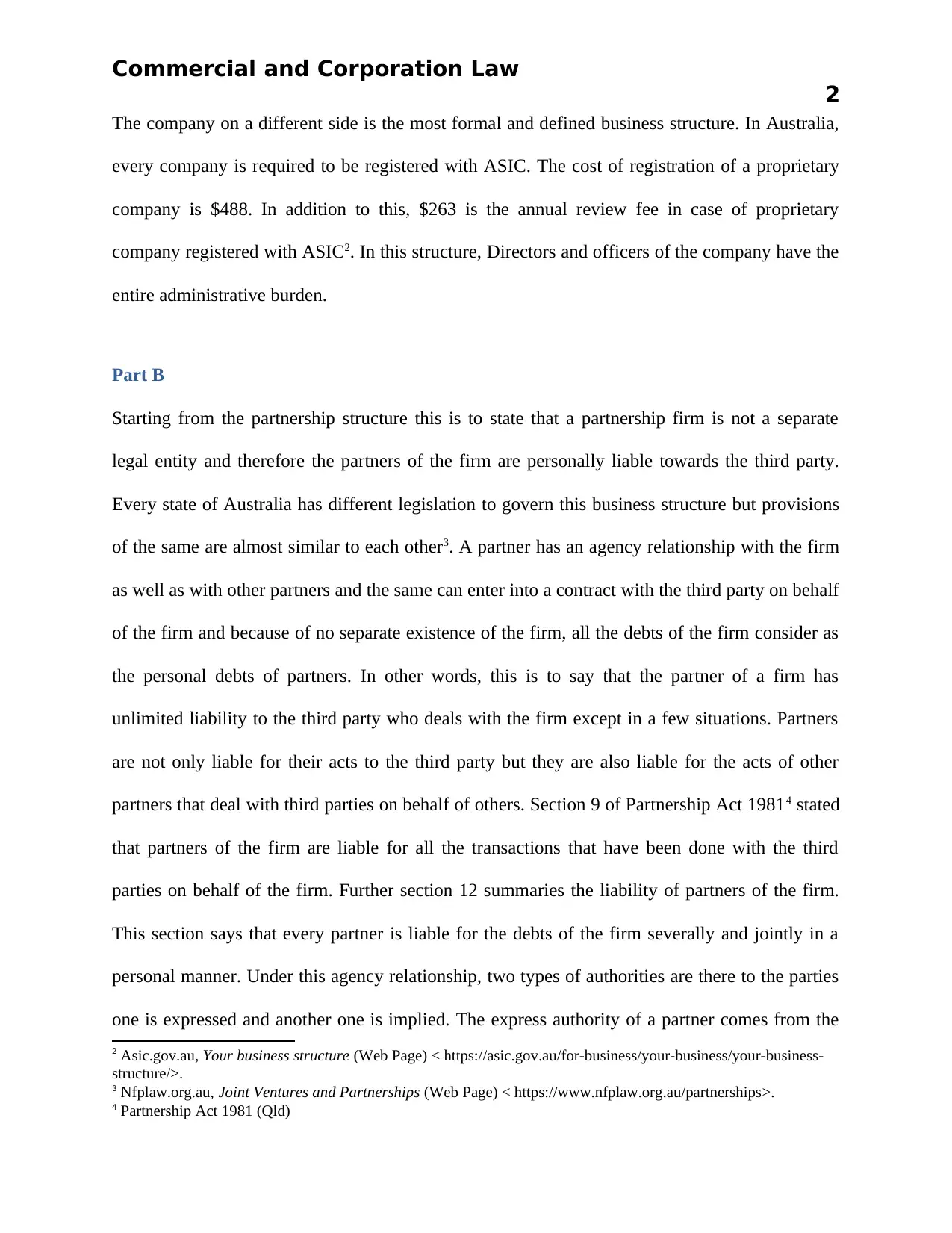
Commercial and Corporation Law
2
The company on a different side is the most formal and defined business structure. In Australia,
every company is required to be registered with ASIC. The cost of registration of a proprietary
company is $488. In addition to this, $263 is the annual review fee in case of proprietary
company registered with ASIC2. In this structure, Directors and officers of the company have the
entire administrative burden.
Part B
Starting from the partnership structure this is to state that a partnership firm is not a separate
legal entity and therefore the partners of the firm are personally liable towards the third party.
Every state of Australia has different legislation to govern this business structure but provisions
of the same are almost similar to each other3. A partner has an agency relationship with the firm
as well as with other partners and the same can enter into a contract with the third party on behalf
of the firm and because of no separate existence of the firm, all the debts of the firm consider as
the personal debts of partners. In other words, this is to say that the partner of a firm has
unlimited liability to the third party who deals with the firm except in a few situations. Partners
are not only liable for their acts to the third party but they are also liable for the acts of other
partners that deal with third parties on behalf of others. Section 9 of Partnership Act 19814 stated
that partners of the firm are liable for all the transactions that have been done with the third
parties on behalf of the firm. Further section 12 summaries the liability of partners of the firm.
This section says that every partner is liable for the debts of the firm severally and jointly in a
personal manner. Under this agency relationship, two types of authorities are there to the parties
one is expressed and another one is implied. The express authority of a partner comes from the
2 Asic.gov.au, Your business structure (Web Page) < https://asic.gov.au/for-business/your-business/your-business-
structure/>.
3 Nfplaw.org.au, Joint Ventures and Partnerships (Web Page) < https://www.nfplaw.org.au/partnerships>.
4 Partnership Act 1981 (Qld)
2
The company on a different side is the most formal and defined business structure. In Australia,
every company is required to be registered with ASIC. The cost of registration of a proprietary
company is $488. In addition to this, $263 is the annual review fee in case of proprietary
company registered with ASIC2. In this structure, Directors and officers of the company have the
entire administrative burden.
Part B
Starting from the partnership structure this is to state that a partnership firm is not a separate
legal entity and therefore the partners of the firm are personally liable towards the third party.
Every state of Australia has different legislation to govern this business structure but provisions
of the same are almost similar to each other3. A partner has an agency relationship with the firm
as well as with other partners and the same can enter into a contract with the third party on behalf
of the firm and because of no separate existence of the firm, all the debts of the firm consider as
the personal debts of partners. In other words, this is to say that the partner of a firm has
unlimited liability to the third party who deals with the firm except in a few situations. Partners
are not only liable for their acts to the third party but they are also liable for the acts of other
partners that deal with third parties on behalf of others. Section 9 of Partnership Act 19814 stated
that partners of the firm are liable for all the transactions that have been done with the third
parties on behalf of the firm. Further section 12 summaries the liability of partners of the firm.
This section says that every partner is liable for the debts of the firm severally and jointly in a
personal manner. Under this agency relationship, two types of authorities are there to the parties
one is expressed and another one is implied. The express authority of a partner comes from the
2 Asic.gov.au, Your business structure (Web Page) < https://asic.gov.au/for-business/your-business/your-business-
structure/>.
3 Nfplaw.org.au, Joint Ventures and Partnerships (Web Page) < https://www.nfplaw.org.au/partnerships>.
4 Partnership Act 1981 (Qld)
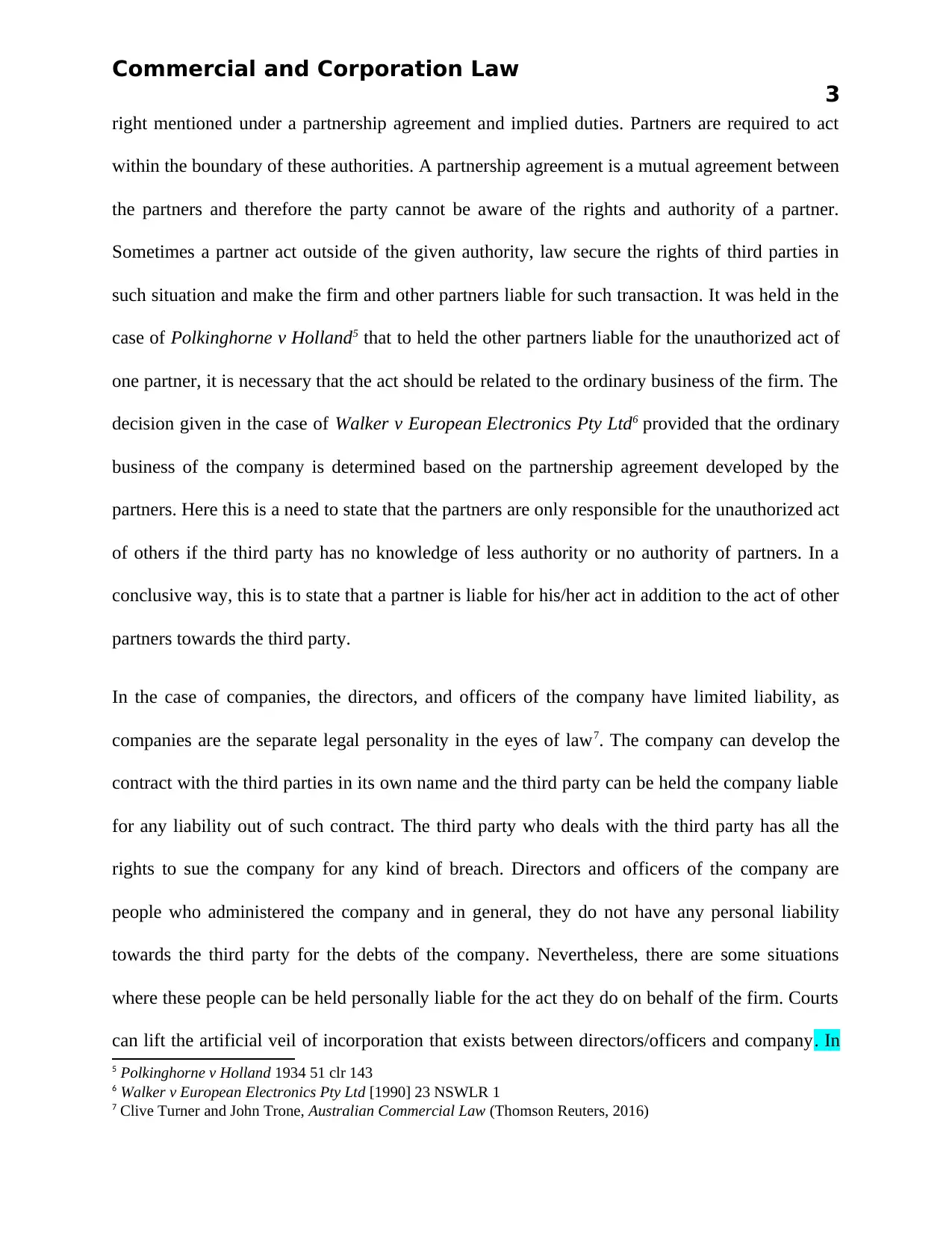
Commercial and Corporation Law
3
right mentioned under a partnership agreement and implied duties. Partners are required to act
within the boundary of these authorities. A partnership agreement is a mutual agreement between
the partners and therefore the party cannot be aware of the rights and authority of a partner.
Sometimes a partner act outside of the given authority, law secure the rights of third parties in
such situation and make the firm and other partners liable for such transaction. It was held in the
case of Polkinghorne v Holland5 that to held the other partners liable for the unauthorized act of
one partner, it is necessary that the act should be related to the ordinary business of the firm. The
decision given in the case of Walker v European Electronics Pty Ltd6 provided that the ordinary
business of the company is determined based on the partnership agreement developed by the
partners. Here this is a need to state that the partners are only responsible for the unauthorized act
of others if the third party has no knowledge of less authority or no authority of partners. In a
conclusive way, this is to state that a partner is liable for his/her act in addition to the act of other
partners towards the third party.
In the case of companies, the directors, and officers of the company have limited liability, as
companies are the separate legal personality in the eyes of law7. The company can develop the
contract with the third parties in its own name and the third party can be held the company liable
for any liability out of such contract. The third party who deals with the third party has all the
rights to sue the company for any kind of breach. Directors and officers of the company are
people who administered the company and in general, they do not have any personal liability
towards the third party for the debts of the company. Nevertheless, there are some situations
where these people can be held personally liable for the act they do on behalf of the firm. Courts
can lift the artificial veil of incorporation that exists between directors/officers and company. In
5 Polkinghorne v Holland 1934 51 clr 143
6 Walker v European Electronics Pty Ltd [1990] 23 NSWLR 1
7 Clive Turner and John Trone, Australian Commercial Law (Thomson Reuters, 2016)
3
right mentioned under a partnership agreement and implied duties. Partners are required to act
within the boundary of these authorities. A partnership agreement is a mutual agreement between
the partners and therefore the party cannot be aware of the rights and authority of a partner.
Sometimes a partner act outside of the given authority, law secure the rights of third parties in
such situation and make the firm and other partners liable for such transaction. It was held in the
case of Polkinghorne v Holland5 that to held the other partners liable for the unauthorized act of
one partner, it is necessary that the act should be related to the ordinary business of the firm. The
decision given in the case of Walker v European Electronics Pty Ltd6 provided that the ordinary
business of the company is determined based on the partnership agreement developed by the
partners. Here this is a need to state that the partners are only responsible for the unauthorized act
of others if the third party has no knowledge of less authority or no authority of partners. In a
conclusive way, this is to state that a partner is liable for his/her act in addition to the act of other
partners towards the third party.
In the case of companies, the directors, and officers of the company have limited liability, as
companies are the separate legal personality in the eyes of law7. The company can develop the
contract with the third parties in its own name and the third party can be held the company liable
for any liability out of such contract. The third party who deals with the third party has all the
rights to sue the company for any kind of breach. Directors and officers of the company are
people who administered the company and in general, they do not have any personal liability
towards the third party for the debts of the company. Nevertheless, there are some situations
where these people can be held personally liable for the act they do on behalf of the firm. Courts
can lift the artificial veil of incorporation that exists between directors/officers and company. In
5 Polkinghorne v Holland 1934 51 clr 143
6 Walker v European Electronics Pty Ltd [1990] 23 NSWLR 1
7 Clive Turner and John Trone, Australian Commercial Law (Thomson Reuters, 2016)
Secure Best Marks with AI Grader
Need help grading? Try our AI Grader for instant feedback on your assignments.
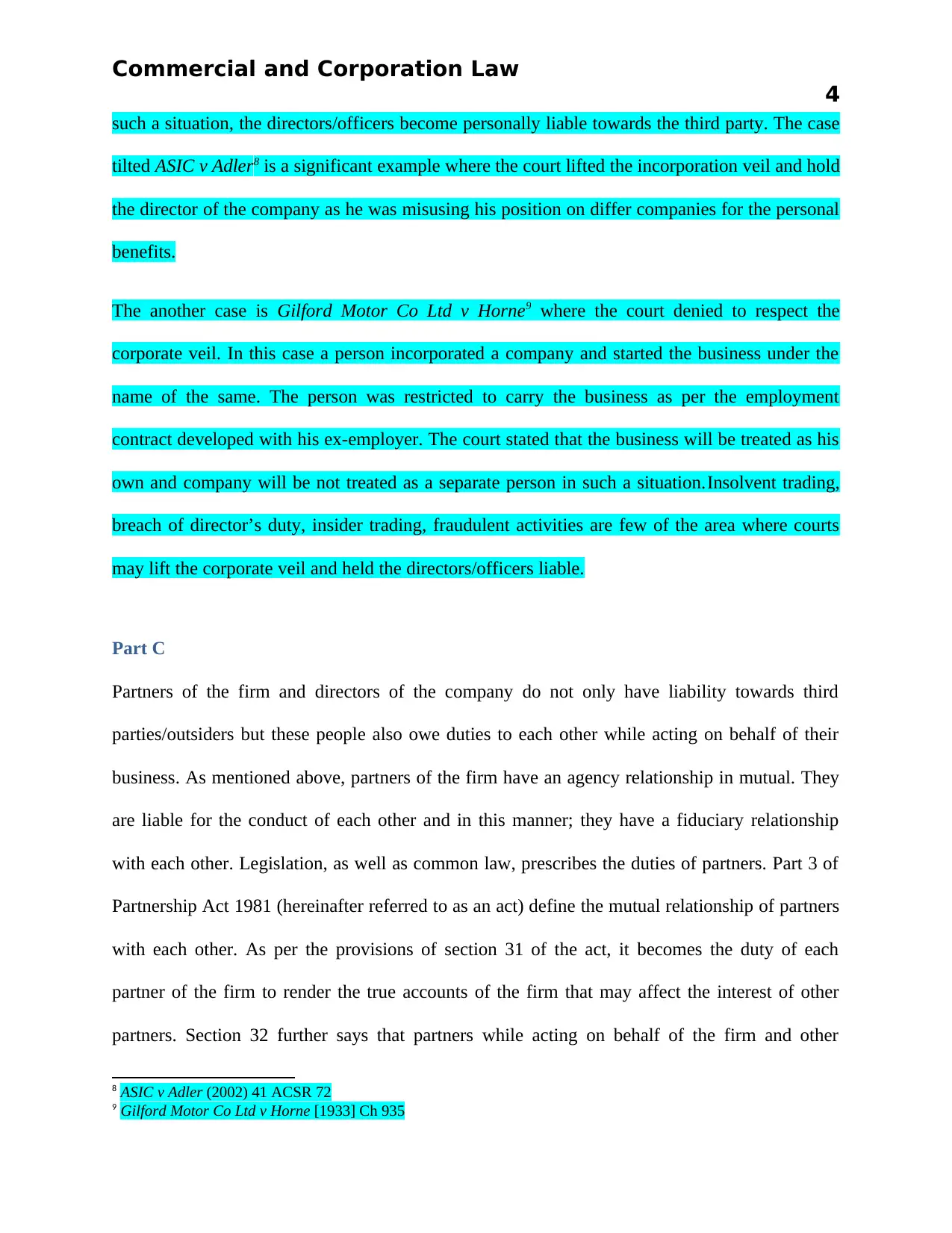
Commercial and Corporation Law
4
such a situation, the directors/officers become personally liable towards the third party. The case
tilted ASIC v Adler8 is a significant example where the court lifted the incorporation veil and hold
the director of the company as he was misusing his position on differ companies for the personal
benefits.
The another case is Gilford Motor Co Ltd v Horne9 where the court denied to respect the
corporate veil. In this case a person incorporated a company and started the business under the
name of the same. The person was restricted to carry the business as per the employment
contract developed with his ex-employer. The court stated that the business will be treated as his
own and company will be not treated as a separate person in such a situation.Insolvent trading,
breach of director’s duty, insider trading, fraudulent activities are few of the area where courts
may lift the corporate veil and held the directors/officers liable.
Part C
Partners of the firm and directors of the company do not only have liability towards third
parties/outsiders but these people also owe duties to each other while acting on behalf of their
business. As mentioned above, partners of the firm have an agency relationship in mutual. They
are liable for the conduct of each other and in this manner; they have a fiduciary relationship
with each other. Legislation, as well as common law, prescribes the duties of partners. Part 3 of
Partnership Act 1981 (hereinafter referred to as an act) define the mutual relationship of partners
with each other. As per the provisions of section 31 of the act, it becomes the duty of each
partner of the firm to render the true accounts of the firm that may affect the interest of other
partners. Section 32 further says that partners while acting on behalf of the firm and other
8 ASIC v Adler (2002) 41 ACSR 72
9 Gilford Motor Co Ltd v Horne [1933] Ch 935
4
such a situation, the directors/officers become personally liable towards the third party. The case
tilted ASIC v Adler8 is a significant example where the court lifted the incorporation veil and hold
the director of the company as he was misusing his position on differ companies for the personal
benefits.
The another case is Gilford Motor Co Ltd v Horne9 where the court denied to respect the
corporate veil. In this case a person incorporated a company and started the business under the
name of the same. The person was restricted to carry the business as per the employment
contract developed with his ex-employer. The court stated that the business will be treated as his
own and company will be not treated as a separate person in such a situation.Insolvent trading,
breach of director’s duty, insider trading, fraudulent activities are few of the area where courts
may lift the corporate veil and held the directors/officers liable.
Part C
Partners of the firm and directors of the company do not only have liability towards third
parties/outsiders but these people also owe duties to each other while acting on behalf of their
business. As mentioned above, partners of the firm have an agency relationship in mutual. They
are liable for the conduct of each other and in this manner; they have a fiduciary relationship
with each other. Legislation, as well as common law, prescribes the duties of partners. Part 3 of
Partnership Act 1981 (hereinafter referred to as an act) define the mutual relationship of partners
with each other. As per the provisions of section 31 of the act, it becomes the duty of each
partner of the firm to render the true accounts of the firm that may affect the interest of other
partners. Section 32 further says that partners while acting on behalf of the firm and other
8 ASIC v Adler (2002) 41 ACSR 72
9 Gilford Motor Co Ltd v Horne [1933] Ch 935
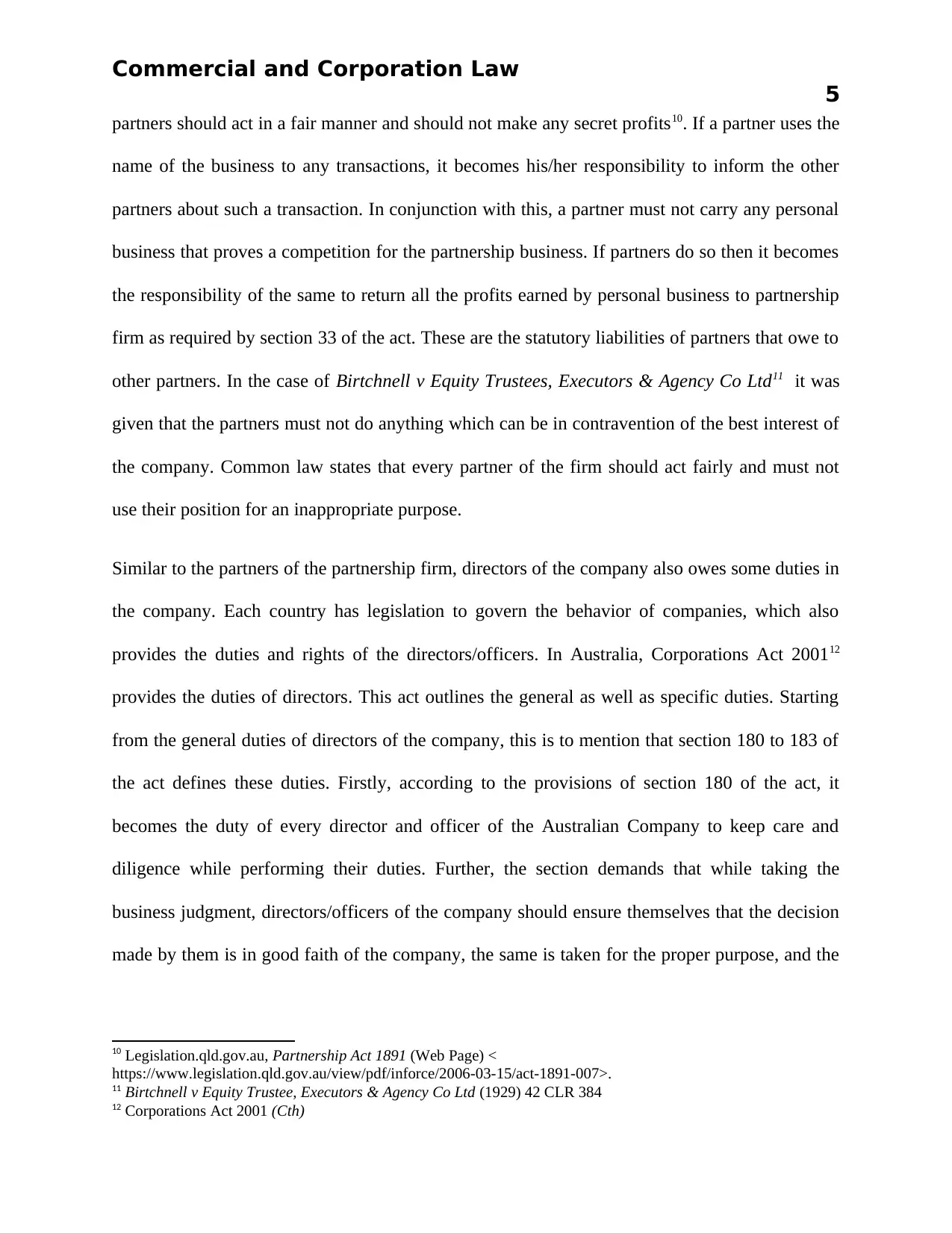
Commercial and Corporation Law
5
partners should act in a fair manner and should not make any secret profits10. If a partner uses the
name of the business to any transactions, it becomes his/her responsibility to inform the other
partners about such a transaction. In conjunction with this, a partner must not carry any personal
business that proves a competition for the partnership business. If partners do so then it becomes
the responsibility of the same to return all the profits earned by personal business to partnership
firm as required by section 33 of the act. These are the statutory liabilities of partners that owe to
other partners. In the case of Birtchnell v Equity Trustees, Executors & Agency Co Ltd11 it was
given that the partners must not do anything which can be in contravention of the best interest of
the company. Common law states that every partner of the firm should act fairly and must not
use their position for an inappropriate purpose.
Similar to the partners of the partnership firm, directors of the company also owes some duties in
the company. Each country has legislation to govern the behavior of companies, which also
provides the duties and rights of the directors/officers. In Australia, Corporations Act 200112
provides the duties of directors. This act outlines the general as well as specific duties. Starting
from the general duties of directors of the company, this is to mention that section 180 to 183 of
the act defines these duties. Firstly, according to the provisions of section 180 of the act, it
becomes the duty of every director and officer of the Australian Company to keep care and
diligence while performing their duties. Further, the section demands that while taking the
business judgment, directors/officers of the company should ensure themselves that the decision
made by them is in good faith of the company, the same is taken for the proper purpose, and the
10 Legislation.qld.gov.au, Partnership Act 1891 (Web Page) <
https://www.legislation.qld.gov.au/view/pdf/inforce/2006-03-15/act-1891-007>.
11 Birtchnell v Equity Trustee, Executors & Agency Co Ltd (1929) 42 CLR 384
12 Corporations Act 2001 (Cth)
5
partners should act in a fair manner and should not make any secret profits10. If a partner uses the
name of the business to any transactions, it becomes his/her responsibility to inform the other
partners about such a transaction. In conjunction with this, a partner must not carry any personal
business that proves a competition for the partnership business. If partners do so then it becomes
the responsibility of the same to return all the profits earned by personal business to partnership
firm as required by section 33 of the act. These are the statutory liabilities of partners that owe to
other partners. In the case of Birtchnell v Equity Trustees, Executors & Agency Co Ltd11 it was
given that the partners must not do anything which can be in contravention of the best interest of
the company. Common law states that every partner of the firm should act fairly and must not
use their position for an inappropriate purpose.
Similar to the partners of the partnership firm, directors of the company also owes some duties in
the company. Each country has legislation to govern the behavior of companies, which also
provides the duties and rights of the directors/officers. In Australia, Corporations Act 200112
provides the duties of directors. This act outlines the general as well as specific duties. Starting
from the general duties of directors of the company, this is to mention that section 180 to 183 of
the act defines these duties. Firstly, according to the provisions of section 180 of the act, it
becomes the duty of every director and officer of the Australian Company to keep care and
diligence while performing their duties. Further, the section demands that while taking the
business judgment, directors/officers of the company should ensure themselves that the decision
made by them is in good faith of the company, the same is taken for the proper purpose, and the
10 Legislation.qld.gov.au, Partnership Act 1891 (Web Page) <
https://www.legislation.qld.gov.au/view/pdf/inforce/2006-03-15/act-1891-007>.
11 Birtchnell v Equity Trustee, Executors & Agency Co Ltd (1929) 42 CLR 384
12 Corporations Act 2001 (Cth)
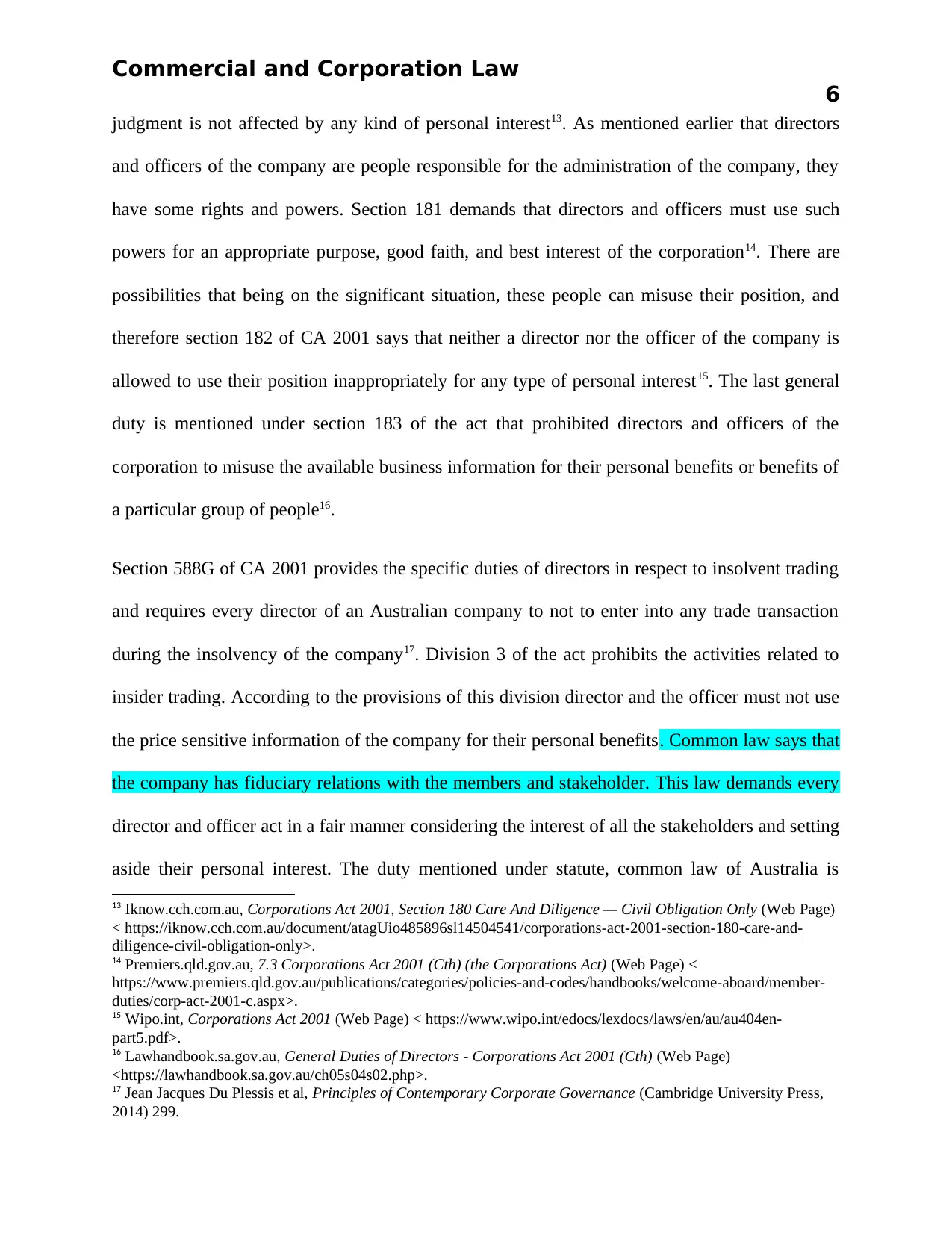
Commercial and Corporation Law
6
judgment is not affected by any kind of personal interest13. As mentioned earlier that directors
and officers of the company are people responsible for the administration of the company, they
have some rights and powers. Section 181 demands that directors and officers must use such
powers for an appropriate purpose, good faith, and best interest of the corporation14. There are
possibilities that being on the significant situation, these people can misuse their position, and
therefore section 182 of CA 2001 says that neither a director nor the officer of the company is
allowed to use their position inappropriately for any type of personal interest15. The last general
duty is mentioned under section 183 of the act that prohibited directors and officers of the
corporation to misuse the available business information for their personal benefits or benefits of
a particular group of people16.
Section 588G of CA 2001 provides the specific duties of directors in respect to insolvent trading
and requires every director of an Australian company to not to enter into any trade transaction
during the insolvency of the company17. Division 3 of the act prohibits the activities related to
insider trading. According to the provisions of this division director and the officer must not use
the price sensitive information of the company for their personal benefits. Common law says that
the company has fiduciary relations with the members and stakeholder. This law demands every
director and officer act in a fair manner considering the interest of all the stakeholders and setting
aside their personal interest. The duty mentioned under statute, common law of Australia is
13 Iknow.cch.com.au, Corporations Act 2001, Section 180 Care And Diligence — Civil Obligation Only (Web Page)
< https://iknow.cch.com.au/document/atagUio485896sl14504541/corporations-act-2001-section-180-care-and-
diligence-civil-obligation-only>.
14 Premiers.qld.gov.au, 7.3 Corporations Act 2001 (Cth) (the Corporations Act) (Web Page) <
https://www.premiers.qld.gov.au/publications/categories/policies-and-codes/handbooks/welcome-aboard/member-
duties/corp-act-2001-c.aspx>.
15 Wipo.int, Corporations Act 2001 (Web Page) < https://www.wipo.int/edocs/lexdocs/laws/en/au/au404en-
part5.pdf>.
16 Lawhandbook.sa.gov.au, General Duties of Directors - Corporations Act 2001 (Cth) (Web Page)
<https://lawhandbook.sa.gov.au/ch05s04s02.php>.
17 Jean Jacques Du Plessis et al, Principles of Contemporary Corporate Governance (Cambridge University Press,
2014) 299.
6
judgment is not affected by any kind of personal interest13. As mentioned earlier that directors
and officers of the company are people responsible for the administration of the company, they
have some rights and powers. Section 181 demands that directors and officers must use such
powers for an appropriate purpose, good faith, and best interest of the corporation14. There are
possibilities that being on the significant situation, these people can misuse their position, and
therefore section 182 of CA 2001 says that neither a director nor the officer of the company is
allowed to use their position inappropriately for any type of personal interest15. The last general
duty is mentioned under section 183 of the act that prohibited directors and officers of the
corporation to misuse the available business information for their personal benefits or benefits of
a particular group of people16.
Section 588G of CA 2001 provides the specific duties of directors in respect to insolvent trading
and requires every director of an Australian company to not to enter into any trade transaction
during the insolvency of the company17. Division 3 of the act prohibits the activities related to
insider trading. According to the provisions of this division director and the officer must not use
the price sensitive information of the company for their personal benefits. Common law says that
the company has fiduciary relations with the members and stakeholder. This law demands every
director and officer act in a fair manner considering the interest of all the stakeholders and setting
aside their personal interest. The duty mentioned under statute, common law of Australia is
13 Iknow.cch.com.au, Corporations Act 2001, Section 180 Care And Diligence — Civil Obligation Only (Web Page)
< https://iknow.cch.com.au/document/atagUio485896sl14504541/corporations-act-2001-section-180-care-and-
diligence-civil-obligation-only>.
14 Premiers.qld.gov.au, 7.3 Corporations Act 2001 (Cth) (the Corporations Act) (Web Page) <
https://www.premiers.qld.gov.au/publications/categories/policies-and-codes/handbooks/welcome-aboard/member-
duties/corp-act-2001-c.aspx>.
15 Wipo.int, Corporations Act 2001 (Web Page) < https://www.wipo.int/edocs/lexdocs/laws/en/au/au404en-
part5.pdf>.
16 Lawhandbook.sa.gov.au, General Duties of Directors - Corporations Act 2001 (Cth) (Web Page)
<https://lawhandbook.sa.gov.au/ch05s04s02.php>.
17 Jean Jacques Du Plessis et al, Principles of Contemporary Corporate Governance (Cambridge University Press,
2014) 299.
Paraphrase This Document
Need a fresh take? Get an instant paraphrase of this document with our AI Paraphraser
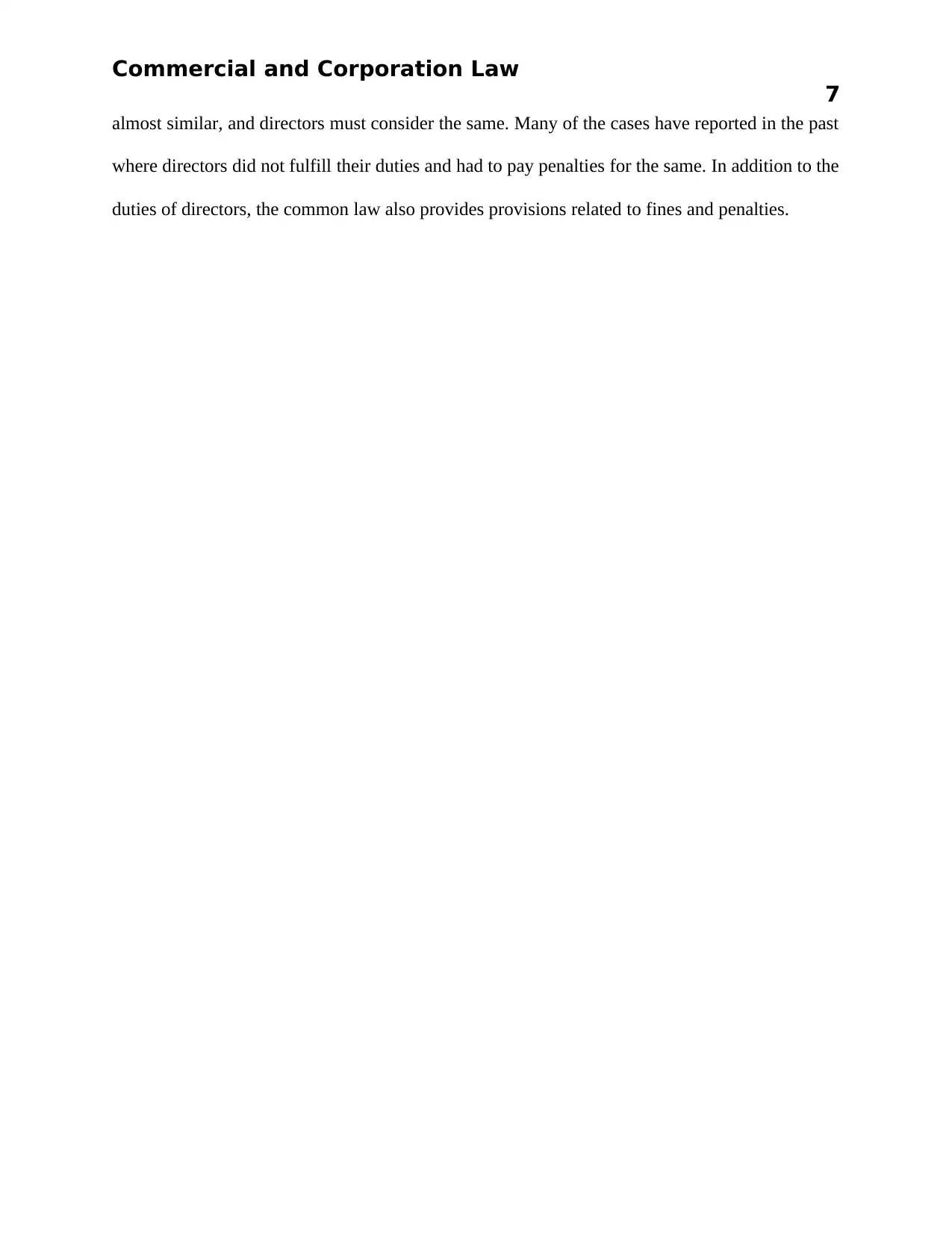
Commercial and Corporation Law
7
almost similar, and directors must consider the same. Many of the cases have reported in the past
where directors did not fulfill their duties and had to pay penalties for the same. In addition to the
duties of directors, the common law also provides provisions related to fines and penalties.
7
almost similar, and directors must consider the same. Many of the cases have reported in the past
where directors did not fulfill their duties and had to pay penalties for the same. In addition to the
duties of directors, the common law also provides provisions related to fines and penalties.
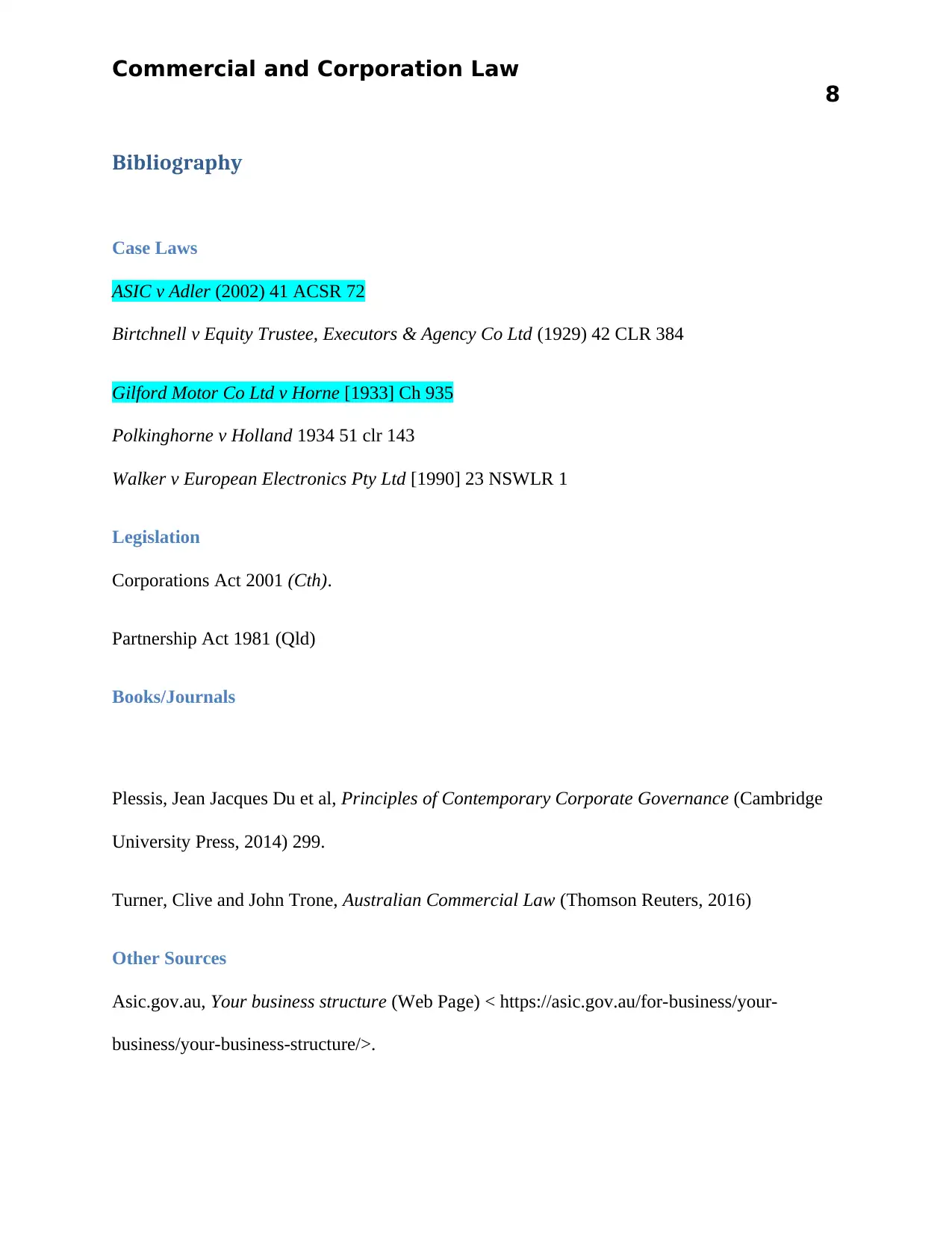
Commercial and Corporation Law
8
Bibliography
Case Laws
ASIC v Adler (2002) 41 ACSR 72
Birtchnell v Equity Trustee, Executors & Agency Co Ltd (1929) 42 CLR 384
Gilford Motor Co Ltd v Horne [1933] Ch 935
Polkinghorne v Holland 1934 51 clr 143
Walker v European Electronics Pty Ltd [1990] 23 NSWLR 1
Legislation
Corporations Act 2001 (Cth).
Partnership Act 1981 (Qld)
Books/Journals
Plessis, Jean Jacques Du et al, Principles of Contemporary Corporate Governance (Cambridge
University Press, 2014) 299.
Turner, Clive and John Trone, Australian Commercial Law (Thomson Reuters, 2016)
Other Sources
Asic.gov.au, Your business structure (Web Page) < https://asic.gov.au/for-business/your-
business/your-business-structure/>.
8
Bibliography
Case Laws
ASIC v Adler (2002) 41 ACSR 72
Birtchnell v Equity Trustee, Executors & Agency Co Ltd (1929) 42 CLR 384
Gilford Motor Co Ltd v Horne [1933] Ch 935
Polkinghorne v Holland 1934 51 clr 143
Walker v European Electronics Pty Ltd [1990] 23 NSWLR 1
Legislation
Corporations Act 2001 (Cth).
Partnership Act 1981 (Qld)
Books/Journals
Plessis, Jean Jacques Du et al, Principles of Contemporary Corporate Governance (Cambridge
University Press, 2014) 299.
Turner, Clive and John Trone, Australian Commercial Law (Thomson Reuters, 2016)
Other Sources
Asic.gov.au, Your business structure (Web Page) < https://asic.gov.au/for-business/your-
business/your-business-structure/>.
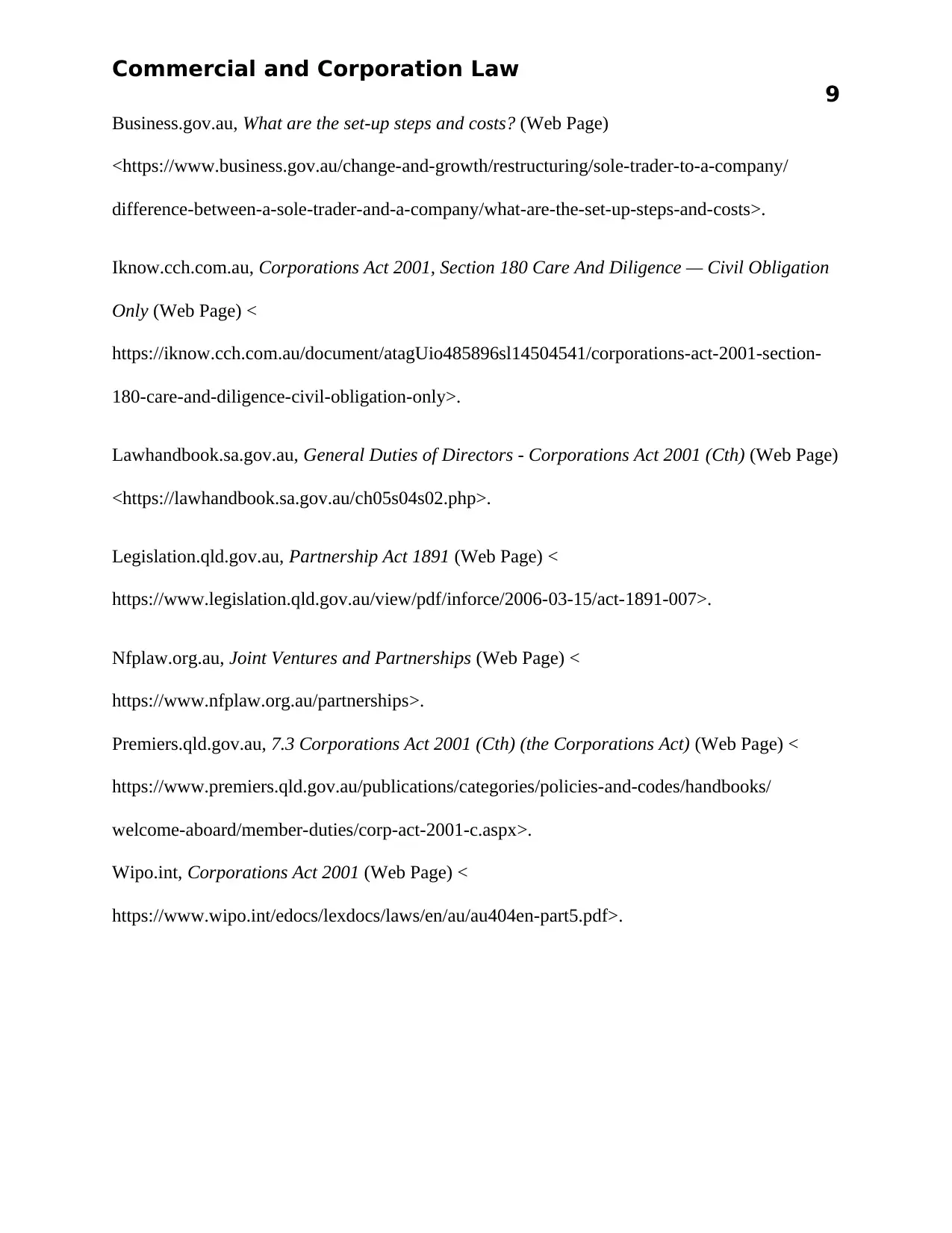
Commercial and Corporation Law
9
Business.gov.au, What are the set-up steps and costs? (Web Page)
<https://www.business.gov.au/change-and-growth/restructuring/sole-trader-to-a-company/
difference-between-a-sole-trader-and-a-company/what-are-the-set-up-steps-and-costs>.
Iknow.cch.com.au, Corporations Act 2001, Section 180 Care And Diligence — Civil Obligation
Only (Web Page) <
https://iknow.cch.com.au/document/atagUio485896sl14504541/corporations-act-2001-section-
180-care-and-diligence-civil-obligation-only>.
Lawhandbook.sa.gov.au, General Duties of Directors - Corporations Act 2001 (Cth) (Web Page)
<https://lawhandbook.sa.gov.au/ch05s04s02.php>.
Legislation.qld.gov.au, Partnership Act 1891 (Web Page) <
https://www.legislation.qld.gov.au/view/pdf/inforce/2006-03-15/act-1891-007>.
Nfplaw.org.au, Joint Ventures and Partnerships (Web Page) <
https://www.nfplaw.org.au/partnerships>.
Premiers.qld.gov.au, 7.3 Corporations Act 2001 (Cth) (the Corporations Act) (Web Page) <
https://www.premiers.qld.gov.au/publications/categories/policies-and-codes/handbooks/
welcome-aboard/member-duties/corp-act-2001-c.aspx>.
Wipo.int, Corporations Act 2001 (Web Page) <
https://www.wipo.int/edocs/lexdocs/laws/en/au/au404en-part5.pdf>.
9
Business.gov.au, What are the set-up steps and costs? (Web Page)
<https://www.business.gov.au/change-and-growth/restructuring/sole-trader-to-a-company/
difference-between-a-sole-trader-and-a-company/what-are-the-set-up-steps-and-costs>.
Iknow.cch.com.au, Corporations Act 2001, Section 180 Care And Diligence — Civil Obligation
Only (Web Page) <
https://iknow.cch.com.au/document/atagUio485896sl14504541/corporations-act-2001-section-
180-care-and-diligence-civil-obligation-only>.
Lawhandbook.sa.gov.au, General Duties of Directors - Corporations Act 2001 (Cth) (Web Page)
<https://lawhandbook.sa.gov.au/ch05s04s02.php>.
Legislation.qld.gov.au, Partnership Act 1891 (Web Page) <
https://www.legislation.qld.gov.au/view/pdf/inforce/2006-03-15/act-1891-007>.
Nfplaw.org.au, Joint Ventures and Partnerships (Web Page) <
https://www.nfplaw.org.au/partnerships>.
Premiers.qld.gov.au, 7.3 Corporations Act 2001 (Cth) (the Corporations Act) (Web Page) <
https://www.premiers.qld.gov.au/publications/categories/policies-and-codes/handbooks/
welcome-aboard/member-duties/corp-act-2001-c.aspx>.
Wipo.int, Corporations Act 2001 (Web Page) <
https://www.wipo.int/edocs/lexdocs/laws/en/au/au404en-part5.pdf>.
1 out of 10
Related Documents
Your All-in-One AI-Powered Toolkit for Academic Success.
+13062052269
info@desklib.com
Available 24*7 on WhatsApp / Email
![[object Object]](/_next/static/media/star-bottom.7253800d.svg)
Unlock your academic potential
© 2024 | Zucol Services PVT LTD | All rights reserved.





